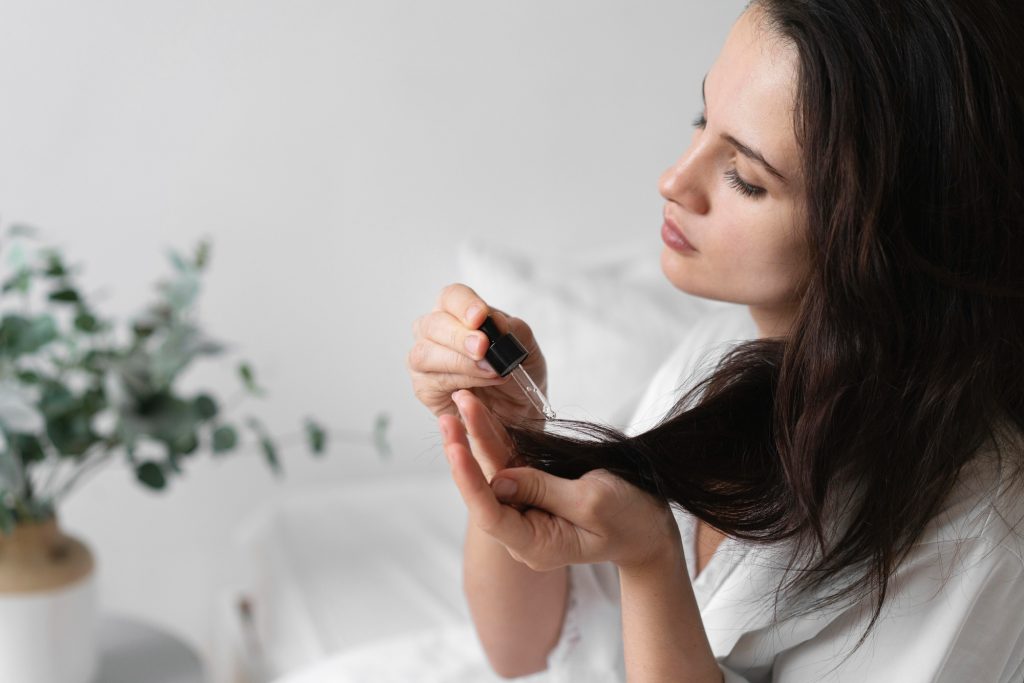Discover whether avoiding certain hair products or ingredients can help combat frizz for those who are prone to it.
Should You Avoid Certain Hair Products or Ingredients If You’re Prone to Frizz?
If you’ve ever battled with frizz, you know how frustrating it can be. One minute your hair is sleek and smooth, and the next it’s a wild, untamed mess. So, what’s the deal with frizz? And should you avoid certain hair products or ingredients if you’re prone to it? Let’s dive in and find out!

Understanding Hair Frizz
We’ve all experienced frizz at some point in our lives. It’s that pesky phenomenon where your hair becomes unruly, poofy, and full of flyaways. Frizz occurs when the outer layer of your hair, known as the cuticle, becomes raised and allows moisture to penetrate the hair shaft. This causes the hair to swell and become frizzy.
Frizz can be caused by a variety of factors, including humidity, heat styling, and even genetics. While it may seem like a never-ending battle, there are ways to combat frizz and keep your hair looking smooth and sleek.
What Causes Hair to Frizz?
Frizz is often the result of a lack of moisture in the hair. When the hair is dry and dehydrated, the cuticle becomes rough and raised, allowing moisture from the air to enter the hair shaft. This leads to swelling and frizz.
In addition to dehydration, certain hair care practices can also contribute to frizz. Overwashing your hair, using harsh shampoos, and exposing your hair to excessive heat can all strip the hair of its natural oils, leaving it dry and prone to frizz.
Another factor that can contribute to frizz is the use of hair products that contain alcohol. Alcohol can be drying to the hair, causing the cuticle to become rough and allowing moisture to seep in.
Furthermore, environmental factors such as pollution and exposure to UV rays can also contribute to frizz. These external elements can damage the hair cuticle, making it more susceptible to frizz.
How Different Hair Types React to Frizz
It’s important to note that not all hair types are created equal when it comes to frizz. While some people may have naturally sleek and smooth hair, others may have hair that is more prone to frizz.
Curly hair, for example, is more susceptible to frizz because the natural shape of the hair follicle makes it easier for moisture to penetrate the hair shaft. The twists and turns of curly hair can create more surface area for moisture to enter, leading to frizz.
On the other hand, straight hair tends to be less prone to frizz due to its smoother cuticle structure. The straighter the hair, the less likely it is to have raised cuticles that allow moisture in.
Fine hair, regardless of its texture, may not experience as much frizz, but it can still be prone to flyaways and static. Fine hair strands are more lightweight and can easily be affected by changes in humidity, leading to frizzy-looking hair.
Thick, coarse hair, on the other hand, has a tendency to be more resistant to frizz. The natural thickness of the hair strands can provide some protection against moisture absorption, making it less prone to frizz.
Understanding how different hair types react to frizz can help you better manage and care for your hair. By identifying your hair type and understanding its unique characteristics, you can choose the right products and styling techniques to minimize frizz and keep your hair looking its best.
Common Ingredients in Hair Products That Cause Frizz
When it comes to hair products, not all are created equal. Some ingredients can actually exacerbate frizz and leave your hair looking even more unruly. Let’s take a look at a few culprits.
Frizz is a common hair concern that many people struggle with. It can be frustrating to deal with and can make your hair appear unkempt and unmanageable. While there are various factors that contribute to frizz, such as humidity and hair type, the ingredients in your hair products can also play a significant role.
Sulfates and Their Impact on Hair
Sulfates are commonly used in shampoos to create that satisfying lather we all love. However, they can be incredibly drying to the hair and scalp. Sulfates strip away the hair’s natural oils, leaving it dry, brittle, and prone to frizz.
When you wash your hair with a sulfate-based shampoo, it may feel squeaky clean, but it’s actually being stripped of its essential moisture. This can lead to the hair shaft becoming rough and porous, making it more susceptible to frizz. Additionally, the scalp can become dry and irritated, leading to further frizz and discomfort.
To avoid sulfates, look for shampoos and cleansers that are labeled “sulfate-free.” These products are formulated to cleanse the hair without stripping away its natural moisture. They use milder surfactants that effectively remove dirt and oil without causing excessive dryness.
Alcohols and Their Drying Effect
Alcohols are often used in hair styling products to help them dry quickly and provide hold. However, not all alcohols are created equal. Some alcohols, such as ethyl alcohol and isopropyl alcohol, can be incredibly drying to the hair.
When these drying alcohols are present in high concentrations in your styling products, they can evaporate the hair’s moisture, leaving it dehydrated and prone to frizz. The lack of moisture in the hair shaft can cause it to become brittle and more susceptible to breakage.
When choosing styling products, opt for ones that contain moisturizing alcohols, such as cetyl alcohol or stearyl alcohol. These alcohols can help to condition the hair and prevent frizz. They have emollient properties that help to lock in moisture, keeping your hair hydrated and less prone to frizz.
Silicones and Their Potential for Buildup
Silicones are commonly found in many hair care products, including shampoos, conditioners, and serums. While they can help to smooth the hair and provide shine, they can also cause buildup over time.
Silicones are synthetic substances that create a coating on the hair shaft, which can make it appear smoother and more manageable. However, this coating can accumulate over time, leading to a heavy, greasy feeling in the hair. When the hair is weighed down by silicone buildup, it can become limp, lifeless, and prone to frizz.
When silicones accumulate on the hair, they can also create a barrier that prevents moisture from penetrating the hair shaft. This can result in dryness and frizz, as the hair is unable to retain the necessary hydration.
To avoid silicones, look for products that are labeled “silicone-free” or use natural alternatives. There are many silicone-free hair care options available that utilize botanical ingredients and nourishing oils to provide hydration and manage frizz without causing buildup.
Understanding the impact of these common ingredients on your hair can help you make more informed choices when it comes to selecting hair products. By opting for sulfate-free shampoos, alcohol-free styling products, and silicone-free formulations, you can effectively combat frizz and achieve smoother, more manageable hair.
Hair Products to Avoid If You’re Prone to Frizz
Now that we’ve covered some common culprits, let’s talk about specific hair products to avoid if you’re prone to frizz.
Shampoos and Conditioners to Steer Clear From
When choosing a shampoo and conditioner, opt for ones that are specifically formulated for frizzy hair. These products are typically free from sulfates and contain ingredients that help to smooth and hydrate the hair.
Avoid shampoos and conditioners that contain sulfates, as they can strip away the hair’s natural oils and leave it dry and prone to frizz. Look for products that are labeled “moisturizing” or “hydrating” to keep your hair happy and frizz-free.
Styling Products That May Exacerbate Frizz
When it comes to styling products, there are a few that can make frizz worse. Avoid products that contain drying alcohols, as they can strip away moisture and leave your hair feeling dry and frizzy.
Additionally, stay away from products that contain heavy silicones, as they can weigh down the hair and lead to buildup. Instead, opt for lightweight serums and oils that provide moisture and shine without leaving a residue.
Alternatives to Frizz-Causing Hair Products
If you’re looking for alternatives to the hair products that can cause frizz, there are plenty of options available.
Natural Ingredients That Combat Frizz
When it comes to combating frizz, nature has provided us with some incredible ingredients. Look for products that contain ingredients like argan oil, coconut oil, and shea butter.
These natural moisturizers can help to nourish the hair and smooth the cuticle, reducing frizz and leaving your locks looking sleek and shiny.
Recommended Frizz-Free Hair Products
If you’re in the market for frizz-free hair products, there are a few brands that consistently receive rave reviews.
One popular option is the Living Proof No Frizz line. This range of products is specifically formulated to combat frizz and create smooth, sleek hair.
Another highly recommended brand is the DevaCurl line. DevaCurl specializes in products for curly hair and offers a range of cleansers, conditioners, and styling products that can help tame frizz and enhance your natural curls.
Tips for Managing Frizzy Hair
While avoiding certain hair products and ingredients can certainly help combat frizz, there are also some best practices you can incorporate into your hair care routine.

Best Hair Care Practices for Frizz Control
One of the best ways to keep frizz at bay is to ensure your hair is properly hydrated. Use a deep conditioning treatment once a week to nourish and moisturize your locks.
Additionally, try to limit heat styling and opt for air-drying when possible. Excessive heat can strip the hair of moisture and exacerbate frizz.
Finally, avoid over-touching your hair throughout the day. Excessive touching can disrupt the hair cuticle and lead to frizz. Instead, style your hair once and then leave it alone.
Professional Treatments for Frizz Reduction
If you’re looking for a more long-term solution to frizz, there are professional treatments available that can help reduce frizz and leave your hair looking smooth and sleek.
One popular treatment is the Brazilian Blowout. This professional treatment is designed to smooth and straighten the hair, reducing frizz and creating a sleek, shiny finish.
Another option is a keratin treatment. Keratin treatments infuse the hair with keratin, a protein that helps to strengthen and smooth the hair. These treatments can help reduce frizz and make your hair more manageable.
In conclusion, while frizz can be a frustrating hair woe, there are steps you can take to minimize its impact. Avoiding certain hair products and ingredients that can exacerbate frizz is a good first step. Opt for moisturizing and frizz-fighting products, and consider incorporating natural ingredients into your hair care routine. Additionally, following best practices for frizz control, such as proper hydration and limited heat styling, can go a long way in taming frizz. And if you’re looking for a more long-term solution, professional treatments may be worth exploring. With the right approach, you can say goodbye to frizz and hello to smooth, sleek hair!





